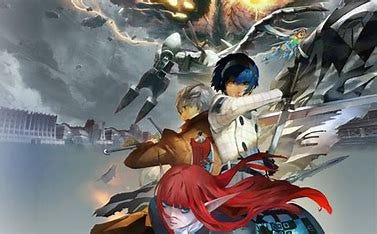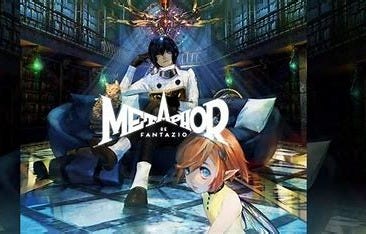[Video Game Review] Metaphor: ReFantazio Review
A perfect example of using video games as a form of storytelling to the point that it feels like you are reading a storybook
There is certainly no denying that video games have come a long way as an art form. While some video games have the goal of just being fun to play (such as call of duty, astro bot, etc.), there are also games that want to engage in storytelling and wants to communicate important messages that they feel the person playing the game needs to hear. Metaphor: ReFantazio certainly falls into this camp (along with other games released this year such as Indika and 1000xRESIST) and does a damn good job doing it. Metaphor: ReFantazio tells the story of the main protagonist (whose name is up to the player to decide) who partakes in a tournament to determine who the next king is going to be in a fantasy world called the United Kingdom of Euchronia after the previous king was assassinated. While it may seem simple at first glance, it does tackle deeper themes of philosophy and morality along your journey to become king.
One important theme that the game succeeds in conveying very efficiently is the importance of diversity. Along your journey, you come across many different diverse groups of intelligent beings along the way that are somewhat human-like such as beings with a third eye on their forehead (such as Eupha), intelligent bat-like beings (such as Heismay), elves (such as Hulkenberg), human-like dolls with beautiful eyes (such as Junah), etc. Whenever you gain a new party member, not only do you gain knowledge regarding their own personal life struggles but also someone who reflects the uniqueness of the tribe they belong to. Whenever you hang out with your new party members with the game’s follower system, you get a sense of who they are as individuals as well as learn what tribe they come from and how that forms who they are as well.
The game itself is fully aware that it is fiction and lets you know that from the beginning of the game. While this may come across to some people as pretentious at first glance, this couldn’t be further from the truth. Instead, the game is smart about this fact and uses it to make a commentary about the relationship between the real world and fiction. Further, the game is smart in its messaging in that it establishes that there needs to be a balance in which fiction is important in the fact that it has meaning and value which can then give us ideals to strive for but not to the point where we use it to escape from the real world and ignore problems that exist in the real world. Instead, we should use the ideals we learn from fiction to help to improve the real world.
The Villian in Metaphor: ReFantazio is also used to convey a message in and of itself. Throughout the game, your main rival Louis Guiabern wants to create a world that is a mixture of meritocracy, atheism and social Darwinism. Guiabern essentially wants to create a world where we only judge people based on their merit instead of any kind of royal bloodline to the point that he believes that only the strong should survive and the weak should die off. For Mr. Guiabern, it doesn’t matter what tribe you belong to and has no problem with diversity just as long as you are strong enough to survive it. Throughout the game, Louis Guiabern surrounds himself with a diverse group of people because he sees them as strong beings that he wants to populate the world with, not weaklings who he feels deserve to die off. Louis Guiabern is solely devoted to his belief system which is meritocracy mixed in with social Darwinism and is not interested in any religion as a result as he feels that religion is just used as a crutch that allows the weak to survive, making him an atheist.
Yet religion and how it shapes morality is another theme that Metaphor: ReFantazio tackles very well. The game does a good job in showing how religion can be corrupted as a means of seeking power which is represented in the game by the Sanctist Church. Metaphor does a good job in showing the corruption of the Sanctist Church as an institution that only wants to use religion and faith as a means of political power instead of bettering the lives of the people in the kingdom (or rather you could argue that the Sanctist Church is arrogant in that it always assumes that every decision made by the Sanctist Church itself is always in everyone’s best interest whether the average person realizes it or not). Yet Metaphor: ReFantazio is careful not to dismiss the importance of religion and faith entirely as the game smartly shows how religion and faith is formed by a person’s cultural upbringing and how we can learn from other religions and faiths that are not their own without us converting to that religion and/or faith ourselves. The solution that Metaphor: ReFantazio suggests is not to convince people that their religion and faith are irrational and that they therefore should abandon their religion and faith altogether (which would be impractical and unrealistic regardless). Rather it is to get people to an emotionally, mentally and physically healthier place where people can use and adopt some reason into their lives instead of only relying on religion and faith (or use reason to engage in critical thinking about what their religion and faith teaches them), and that religion and faith should never be an obstacle when it comes to improving a person’s mental and physical health. Before Eupha becomes a party member in the game, she believes that she must sacrifice her life to protect the livelihood of her village because her religion and faith tell her to do so and considers it an honor to do so. However, by teaching her that there is value and purpose in living her own life instead of sacrificing herself along with convincing her that a god that demands martyrs and tragedy is not a God that deserves devotion, she comes to the conclusion that the God that she believes in would never demand anyone to be sacrificed and that therefore this teaching is a false one and that therefore the God standing before her is not really her God at all. Instead of sacrificing herself, she vows to fight for the values she believes her religion and faith actually teaches and joins your party afterwards. Yet what Metaphor: ReFantazio also communicates effectively is that it is important to have some degree of faith and belief in something even if it doesn’t come from religion at all. For example, it is okay to not have a belief in any God but to instead have belief in your friends or the work you do.
While Metaphor acknowledges that institutions can be flawed, it also shows why institutions are important as well and that institutions do need to be reformed, not destroyed. Louis Guiabern himself is someone who is an anti-institutionalist who wants to tear everything down for the sake of his belief system of meritocracy mixed in with social Darwinism. By contrast, the protagonist realizes that institutions such as the Sanctist Church are flawed and that how previous kings chose to rule and the decisions they made while they ruled were also flawed. The protagonist came to realize that his father suffered a lot of grief as king after losing both his wife and son to the point that he chose not to exert leadership to the point that he let himself be pushed around by the corrupt leadership of the Sanctist Church. Yet the protagonist instead decides to reform government by just being a good king that listens to its people and exerts the kind of leadership that improves the lives of the people throughout the kingdom. The protagonist still allows the Sanctist Church to continue existing after becoming king as he realizes that a lot of people still follow the teachings of the Sanctist Church even if the Church’s reputation has been badly damaged. Rather, the protagonist allows the Sanctist Church to reform itself by getting rid of its own corruption.
As for the gameplay, it is going to be very familiar to those who have played Atlus RPGs such as the Persona games. Archetypes in this game work similarly to how personas work in the persona series with the catch here being that any party member can switch archetypes instead of just the protagonist being able to switch personas. In the persona series, only the main character can switch personas. Now all characters can switch personas, which is an interesting change from before. Other than that, though, the gameplay is largely the same as the persona games and carries with it the same problems as before. The gameplay can get repetitive as you go from dungeon to dungeon on your runner slicing down enemies over and over again. While the enemies you face do have their fair share of variety, it matters little when you enter the same repetitive rhythm over and over again.
The gameplay is an afterthought here though as the story here is the main focus and the thing that stays with me long after the credits roll. It gets to the point where I wonder whether the gameplay part is necessary and wonder whether it would have been better as a TV show. Nonetheless, if I can only get it in game form then that will make me happy regardless.
Final Score: 9/10




